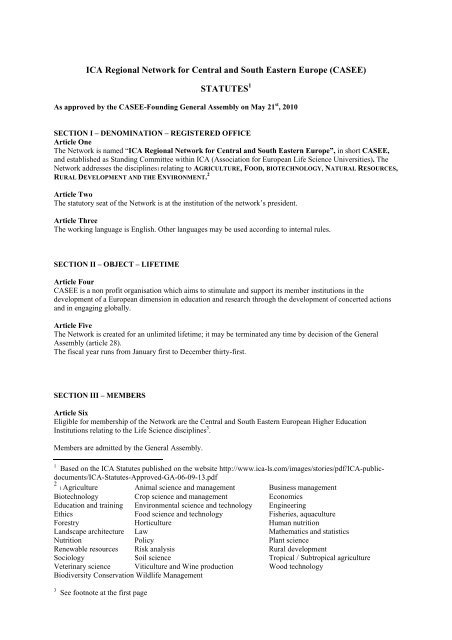ICA Regional Network for Central and South Eastern Europe (CASEE)
ICA Regional Network for Central and South Eastern Europe (CASEE)
ICA Regional Network for Central and South Eastern Europe (CASEE)
Create successful ePaper yourself
Turn your PDF publications into a flip-book with our unique Google optimized e-Paper software.
<strong>ICA</strong> <strong>Regional</strong> <strong>Network</strong> <strong>for</strong> <strong>Central</strong> <strong>and</strong> <strong>South</strong> <strong>Eastern</strong> <strong>Europe</strong> (<strong>CASEE</strong>)<br />
STATUTES 1<br />
As approved by the <strong>CASEE</strong>-Founding General Assembly on May 21 st , 2010<br />
SECTION I – DENOMINATION – REGISTERED OFFICE<br />
Article One<br />
The <strong>Network</strong> is named “<strong>ICA</strong> <strong>Regional</strong> <strong>Network</strong> <strong>for</strong> <strong>Central</strong> <strong>and</strong> <strong>South</strong> <strong>Eastern</strong> <strong>Europe</strong>”, in short <strong>CASEE</strong>,<br />
<strong>and</strong> established as St<strong>and</strong>ing Committee within <strong>ICA</strong> (Association <strong>for</strong> <strong>Europe</strong>an Life Science Universities). The<br />
<strong>Network</strong> addresses the disciplines1 relating to AGRICULTURE, FOOD, BIOTECHNOLOGY, NATURAL RESOURCES,<br />
RURAL DEVELOPMENT AND THE ENVIRONMENT. 2<br />
Article Two<br />
The statutory seat of the <strong>Network</strong> is at the institution of the network’s president.<br />
Article Three<br />
The working language is English. Other languages may be used according to internal rules.<br />
SECTION II – OBJECT – LIFETIME<br />
Article Four<br />
<strong>CASEE</strong> is a non profit organisation which aims to stimulate <strong>and</strong> support its member institutions in the<br />
development of a <strong>Europe</strong>an dimension in education <strong>and</strong> research through the development of concerted actions<br />
<strong>and</strong> in engaging globally.<br />
Article Five<br />
The <strong>Network</strong> is created <strong>for</strong> an unlimited lifetime; it may be terminated any time by decision of the General<br />
Assembly (article 28).<br />
The fiscal year runs from January first to December thirty-first.<br />
SECTION III – MEMBERS<br />
Article Six<br />
Eligible <strong>for</strong> membership of the <strong>Network</strong> are the <strong>Central</strong> <strong>and</strong> <strong>South</strong> <strong>Eastern</strong> <strong>Europe</strong>an Higher Education<br />
Institutions relating to the Life Science disciplines 3 .<br />
Members are admitted by the General Assembly.<br />
1 Based on the <strong>ICA</strong> Statutes published on the website http://www.ica-ls.com/images/stories/pdf/<strong>ICA</strong>-publicdocuments/<strong>ICA</strong>-Statutes-Approved-GA-06-09-13.pdf<br />
2 1 Agriculture Animal science <strong>and</strong> management Business management<br />
Biotechnology Crop science <strong>and</strong> management Economics<br />
Education <strong>and</strong> training Environmental science <strong>and</strong> technology Engineering<br />
Ethics Food science <strong>and</strong> technology Fisheries, aquaculture<br />
Forestry Horticulture Human nutrition<br />
L<strong>and</strong>scape architecture Law Mathematics <strong>and</strong> statistics<br />
Nutrition Policy Plant science<br />
Renewable resources Risk analysis Rural development<br />
Sociology Soil science Tropical / Subtropical agriculture<br />
Veterinary science Viticulture <strong>and</strong> Wine production Wood technology<br />
Biodiversity Conservation Wildlife Management<br />
3 See footnote at the first page
Article Seven<br />
1. All the members of the <strong>Network</strong> are free to withdraw with a six-month notice by sending their resignations by<br />
recorded delivery with acknowledge of receipt to the Secretary General. However, be<strong>for</strong>e actual withdrawing,<br />
resigning members shall have to fulfil all their obligations towards the <strong>Network</strong>.<br />
2. Members may be excluded or suspended on decision by the General Assembly ruling by a majority of two<br />
thirds of the votes cast of represented members, after having been given the right to defend themselves. The<br />
concerned party should be in<strong>for</strong>med in writing 40 days be<strong>for</strong>e the General Assembly with a registered letter.<br />
3. Suspension of membership may be decided by the General Assembly if a member fails to pay its fee <strong>for</strong> TWO<br />
consecutive years<br />
Article Eight<br />
Members shall pay a membership fee fixed annually by the General Assembly.<br />
SECTION IV – GENERAL ASSEMBLY<br />
Article Nine<br />
The General Assembly is the governing body of the <strong>Network</strong>.<br />
It has authority to:<br />
1. Determine the general policy of the Netowrk;<br />
2. Admit or exclude members;<br />
3. Elect the Board members <strong>and</strong> approve the Board’s selection of the members of the Executive Committee<br />
including the Secretary General<br />
4. Approve the balance sheet, accounts <strong>and</strong> budgets;<br />
5. Make amendments to the Statutes of the <strong>Network</strong>;<br />
6. Take any decision exceeding the powers legally or statutorily granted to the Board;<br />
7. Terminate voluntarily the <strong>Network</strong>.<br />
Article Ten<br />
The General Assembly is made up of Rectors <strong>and</strong> Deans or other duly appointed representatives of all member<br />
instutions who have paid their membership fees<br />
It is chaired by the President, the Vice-President or, failing that, any other member appointed by the President.<br />
Article Eleven<br />
The General Assembly shall convene once a year.<br />
In addition the General Assembly may convene when one third or more of the members so request.<br />
Article Twelve<br />
The General Assembly shall be called by the Secretary General at least <strong>for</strong>ty-five days be<strong>for</strong>e the meeting.<br />
Convening notices shall contain a provisional agenda of the Assembly.<br />
Proposals or amendments to the Statutes of the <strong>Network</strong> which were not mentioned in the convening notice shall<br />
not be tabled <strong>for</strong> deliberation.<br />
Article Thirteen<br />
All members have an equal right to cast one vote.<br />
Members who cannot attend may be represented at the General Assembly by other members by sending a proxy<br />
<strong>for</strong>m. In this case each member attending the General Assembly may have a maximum of three proxies.<br />
Article Fourteen<br />
The General Assembly is validly constituted when one third of the members having paid their membership fee in<br />
the previous year are represented, <strong>and</strong> decisions are reached by simple majority of the votes cast (see <strong>for</strong><br />
exceptions articles 7 <strong>and</strong> 26).<br />
Article Fifteen<br />
The Annual General Assembly shall appoint two auditors of nationality different from that of the Treasurer <strong>for</strong> a<br />
renewable three-year term, <strong>and</strong> give them the responsibility of auditing the <strong>Network</strong>’s accounts.<br />
Article Sixteen<br />
The deliberations of the General Assembly shall be minuted <strong>and</strong> signed by the Chairperson of the session <strong>and</strong><br />
countersigned by the Secretary General or, failing that, by one of the members of the Executive Committee.
All members or third parties able to prove their legitimate interest may ask <strong>for</strong> a copy of the minutes signed by<br />
the Chairperson or the Secretary General.<br />
SECTION V – THE BOARD<br />
Article Seventeen<br />
The <strong>Network</strong>’s strategy <strong>and</strong> objectives are developed by the Board <strong>and</strong> proposed to the General Assembly.<br />
The Board is responsible <strong>for</strong> the general administration of the <strong>Network</strong>.<br />
The Board is responsible <strong>for</strong> defining internal working rules (byelaws) within the framework of these Statutes.<br />
The Board shall be composed of the President, the Vice-President the Treasurer <strong>and</strong> at least three ordinary<br />
members. A balanced distribution of the members over the different regions of <strong>Central</strong> <strong>and</strong> <strong>South</strong> <strong>Eastern</strong> <strong>Europe</strong><br />
will be assured.<br />
The members of the Board are elected by the General Assembly <strong>for</strong> a three-year term that is renewable once.<br />
The Board can decide to co-opt one additional Board member <strong>for</strong> specific purposes until the next General<br />
Assembly.<br />
The President <strong>and</strong> Vice-President <strong>and</strong> Treasurer are elected by the Board members. The President is the<br />
Chairperson of the Board.<br />
The Board is to meet at least once a year.<br />
Article Eighteen:<br />
The widest power to per<strong>for</strong>m any acts of administration <strong>and</strong> arrangement which concern the <strong>Network</strong> are vested<br />
in the Board.<br />
The Board shall administer the <strong>Network</strong> according to the general strategy <strong>and</strong> policy approved by the General<br />
Assembly, <strong>and</strong> shall decide in particular about projects related to education, training <strong>and</strong> research organised by<br />
the <strong>Network</strong>. The Board shall also decide about publications.<br />
Article Nineteen<br />
By their functions, members of the Board do not assume any personal liability. Their responsibilities are limited<br />
to their terms of office.<br />
Members of the Board shall not receive payment <strong>for</strong> the per<strong>for</strong>mance of their duties.<br />
SECTION VI – THE EXECUTIVE COMMITTEE<br />
Article Twenty<br />
The Board shall delegate the execution of the policy of the Board to the Executive Committee (ExCo).<br />
The Executive Committee shall be composed of the Secretary General <strong>and</strong> at least four ordinary members.<br />
The members of the Executive Committee are appointed by the Board <strong>and</strong> approved by the General Assembly<br />
<strong>for</strong> a three-year term that is renewable.<br />
The Board appoints a Secretary General.<br />
The duties <strong>and</strong> tasks of the ExCo <strong>and</strong> the Secretary General are defined by the Board.<br />
Article Twenty-one<br />
The Executive Committee can decide to establish temporary Task Forces (TF) in order to address specific tasks .<br />
Task Forces report to the ExCo.<br />
Article Twenty-two<br />
Actions exceeding day-to-day management <strong>and</strong> committing the <strong>Network</strong> shall be signed by the President or<br />
Vice-President <strong>and</strong> countersigned by the Secretary General.<br />
Legal proceedings as plaintiff or defendant shall be managed by the Board represented by the President.<br />
Financial accounts exceeding the field of current expenses shall be signed by the President <strong>and</strong> the Treasurer.<br />
Article Twenty-three<br />
By their functions, members of the Executive Committee do not assume any personal liability. Their<br />
responsibilities are limited to their terms of office.<br />
Members of the Executive Committee shall not receive payment <strong>for</strong> the per<strong>for</strong>mance of their duties (except <strong>for</strong><br />
the Secretary General <strong>and</strong> the Executive Secretary who are paid professionals; or with the agreement of the<br />
Board).
SECTION VII –ANNUAL ACCOUNTS – BUDGETS<br />
Article Twenty-four<br />
By January thirty-first of each year, the Treasurer shall make up the accounts of the previous year. The<br />
Executive Committee shall submit the accounts <strong>and</strong> a proposed budget <strong>for</strong> the following year <strong>for</strong> approval of the<br />
Board who then submits those documents to the General Assembly.<br />
Article Twenty-five<br />
Auditors appointed according to article 15 of the present Statutes shall carry out the annual audit of the <strong>Network</strong><br />
<strong>and</strong> report to the General Assembly.<br />
SECTION VIII – AMENDMENTS – WINDING UP – LIQUIDATION<br />
Article Twenty-six<br />
The General Assembly may deliberate amendments to the Statutes if their objects are expressly stated in the<br />
convening notice. Amendments shall be adopted by a majority of two thirds of the votes cast. The members<br />
should be in<strong>for</strong>med in writing 40 days be<strong>for</strong>e the General Assembly<br />
Article Twenty-seven<br />
The General Assembly may decide the termination of the <strong>Network</strong> under the same conditions as mentioned in<br />
article 26.<br />
Article Twenty-eight<br />
In the event of a voluntary termination, the General Assembly shall appoint one or two liquidators <strong>and</strong> specify<br />
their powers.<br />
Article Twenty-nine<br />
In the event of any termination, whether voluntary or judicial, at any time <strong>and</strong> <strong>for</strong> any reason, the General<br />
Assembly shall decide by a simple majority to allot the <strong>Network</strong> assets, after liabilities have been discharged, to<br />
an institution whose object <strong>and</strong> purpose are similar to the present <strong>Network</strong>.



